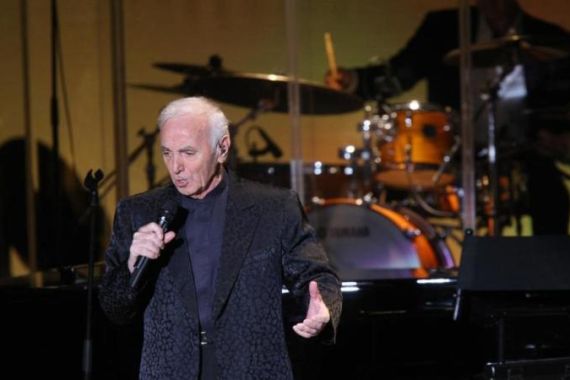Aznavour: The last of the polyglot humanists
France’s beloved balladeer, after 70 years of exporting nostalgia and Gallic charm, now advocates fo

Charles Aznavour, France’s male answer to Edith Piaf, has been travelling the world since the beginning of the year for presumably his last farewell tour. After Tel Aviv, Yerevan, Rome, Barcelona, Berlin, London, Warsaw, Montreal, Los Angeles, and New York’s Madison Square Garden only last week, Aznavour will perform next week in Moscow, followed closely by Geneva and Antwerp.
At 90, the French chanteur is a phenomenon in many more ways than one. His longevity, of course, is prodigious, but what he represents is probably even more impressive. A permanent delegate of Armenia (his parents’ country) to UNESCO, and Armenia’s ambassador to Switzerland where he lives, Aznavour is also a diplomat and a humanist whose career in films, songs, and song-writing has spanned more than 70 years.
Keep reading
list of 4 itemsEurope pledges to boost aid to Sudan on unwelcome war anniversary
Birth, death, escape: Three women’s struggle through Sudan’s war
Does Israel twist humanitarian law to justify Gaza carnage?
A few weeks ago, Aznavour pleaded in favour of Iraqi Christians fleeing the Islamic State of Iraq and the Levant’s (ISIL) persecutions. He urged the French government to welcome as many Christian refugees from Syria and Iraq as possible. On August 13, in a public letter published in Le Figaro, he audaciously suggested to the French authorities to welcome the refugees from Syria and Iraq and to house them in France’s many deserted villages where churches, post offices, schools, farms, and fields have been abandoned.
|
His unique tenor voice, able to reach rich lows, adds extra colour, depth and drama to his songs of lost loves, and times past. Aznavour, the son of immigrants, has always managed to capture the essential longing and inherent melancholia of displaced people such as his parents. His songs provide some rich material for exiles all over the world. |
“Why not confide those villages, France’s ghost towns, to those refugees who will help revive them? They’re hard workers, they’ll be able to live there in peace, work the land, and contribute to France’s prosperity.”
The audacity of wisdom.
As has been obvious to his world audience, from his first appearances in films such as in François Truffaut’s crime drama “Tirez sur le pianist” (Shoot the pianist) in 1960, to his songwriting, Charles Aznavour is a humanist and an ecumenical force. Out of the 900 songs he has authored, he has written 200 songs in English, 200 in Italian, 70 in Spanish and as many in German. He performs in all those languages and enjoys singing duos with artists from all over the world, from Liza Minnelli, to Celine Dion, Julio Iglesias and Placido Domingo.
Son of immigrants
Born in Paris in 1924, the son of Armenian parents but also unmistakably French, Aznavour has always symbolised a kind of nostalgia a la francaise. Aznavour has, for instance, always been hugely popular among Iranians, Lebanese, Egyptians, and Middle-Easterners in general. It’s almost as if Aznavour could be one of them.
La Boheme, one of his best-known songs, which he recorded in a dozen languages, is an international anthem for anyone cherishing an old-fashioned idea of France, one that never seems to go away. With its strong harmony and melody, and a storyline that is both melancholic and sentimental, La Boheme continues to touch the hearts of millions of people throughout the world.
Typical of his repertoire, La Boheme tells the story of an old artist revisiting his youth in Montmartre, painting, being penniless, hungry and yet happy, living with his girlfriend, a model.
“We all thought we had some genius. We were exhausted and yet so happy. We loved life so much. We were young, we were mad, it was la boheme.”
And he finishes with this poignant line: “But today, la boheme doesn’t mean anything any more.”
His unique tenor voice, able to reach rich lows, adds extra colour, depth and drama to his songs of lost loves, and times past. Aznavour, the son of immigrants, has always managed to capture the essential longing and inherent melancholia of displaced people such as his parents. His songs provide some rich material for exiles all over the world.
In a time of growing tensions, inward looking chauvinism, and religious hatred, Charles Aznavour, France’s national treasure, seems to be one of the last representatives of a disappearing species: the polyglot humanists. His tolerance and immense talent are the two faces of his extraordinary and enduring appeal, alongside his irresistible Gallic charm.
Agnes Poirier is the UK editor for the French political weekly MARIANNE, and a political commentator for the British, American, Canadian, French and Italian press, and a regular contributor to the BBC, Sky News, and Al Jazeera. She is the author of ‘Touche, A French woman’s take on the English.’
